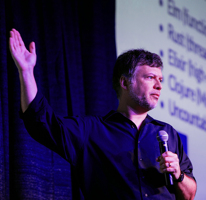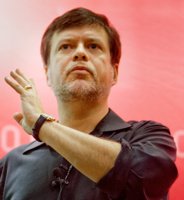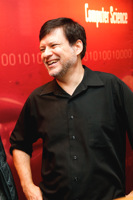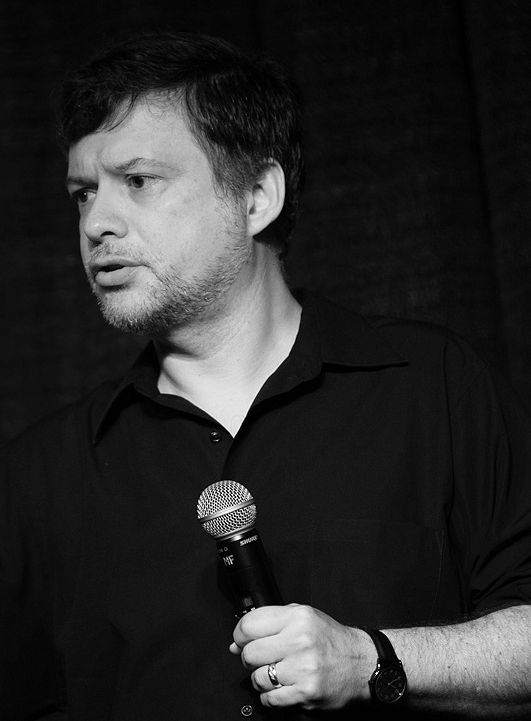Toolshed Technologies
Andy Hunt
Author, Programmer, Musician
On Writing: It's Not the Words
12/09/2008
While reviewing a manuscript the other day, something occurred to me, something that many authors (myself included) tend to forget: the words aren’t the important part. Writing is not about the words.
We get too attached to words. Especially the words we’ve slaved over and poured out on the paper. But good writing is not about the words; you can throw out all those words, and replace them with other words, and it can still mean the same thing. And as with code, throwing out all the words/code and starting over practically guarantees a better result. Let me explain.
I belong to a local songwriter’s association. Once a month, we meet and critique each other’s latest efforts (alas, I haven’t been participating as often as I’d like, but that’s what New Year’s Resolutions are for.) While critiquing other people’s lyrics and song structures, I’m constantly amazed at the similarities to the book writing process. Beginners make the same sorts of mistakes, and experts work their craft with similar subtlety.
Novice song writers (and sometimes those who should know better) tend to use too many words. Instead of showing the audience an idea, they feel compelled to tell the audience all about it. In detail, with all the articles, pronouns and other trappings of regular speech. But most good songs aren’t written that way; it’s generally not the same style as a novel or spoken speech.
Reminds me of an old limerick:
There once was a young poet named Stan
Whose poetry just wouldn’t scan
When asked why, he said in reply
“It’s because I try to fit as many words on the last line as I possibly can“
But here’s the thing. When writing a song, sometimes you have to rework the lyrics to fit the music, and sometimes you change the music to fit the words. To maintain a fixed rhyme scheme or meter, your choice of words can get quite restricted. And you know what? Not only is that a great exercise, but in the end the song has the same meaning. The words “don’t matter” in that there are many other words that would do, but we end up using these particular words because they rhyme, or have the necessary number of syllables and stress in the right place, and so on.
So what does this mean to writing in general?
Show, Don’t Tell

First, remember to show your audience what you want to convey, don’t just tell them about it. The difference is subtle, but important. Showing and explaining is much more direct than telling. Telling is monologue, and monotonous; a good book is a dialogue, and engaging.
I get a chuckle every time I see an author write, “I’d like to tell you all about xyzzy now.” Just tell me!
You don’t have to disclose everything you know about a subject. I’m sure the history of a technology and biographies of the major players involved is fascinating, but most of the time that sort of information just isn’t relevant to the topic at hand. Rip it out of the book, and save it for a blog post.
Map it out
Dave relates writing to the Hero’s Journey. But it’s all too easy to forget the whole “journey” part.

If a book is a journey, you need to start with a map. Not an outline of the topics you’re going to cover, but a map of where you’re taking the reader. As author you’re not just doing a brain-dump of information onto the paper, you’re taking the reader on a trip.
What are the landmarks you’ll see along the way? Is this the place where you’ll lead the reader up to the brink of the chasm and show them the steep cliffs before showing them the easy path down? Or are you going to lead them on the easy path, and point up to the menacing cliffs you avoided?
What will the reader feel along the way? Are you going to lose their attention across the boring vast plains in the middle? (Maybe you don’t want to cross those plains in that case :-) At each rest break, what can you do to keep them excited enough to continue the journey?
I find myself constantly asking authors to provide more roadmaps or markers for the journey. Tell me where we’re headed next. Remind me where we’ve been, what lies ahead, and how they are connected. Remind me what the important parts were that we just saw.
Before you start writing, before you think about an outline, think about a map—from the reader’s perspective. Draw out their journey, and begin to plan the sights you’ll see, the stopping points, which parts will be going uphill and difficult, and which parts will be downhill and easy.
Then you can start writing the words.
It’s an agile world, so of course you can (and should) go back and revise your map as needed.
In keeping with the plot/story analogy, you can also think of your map as a storyboard. Draw out the “scenes,” again from the reader’s perspective.
In keeping with the themes from Pragmatic Thinking and Learning, I will of course suggest that you hand-draw both the map and storyboards.
Sketching out what the journey will look like ensures that there is a journey. Otherwise, you may as well just be writing a dictionary…
It’s not the words
Finally, let me suggest that writing is not even about writing. It’s about re-writing. As many times as it takes. Maybe 5. Maybe 50. But that’s okay, because the actual words on the paper aren’t that important. Toss ‘em out, and try some others.
This is a first draft, by the way. So it likely has some of the very drawbacks I’ve pointed out :-) But maybe I’ll come back to it and revise it as needed.
This is version 1.0, as of 2008-12-09.
/\ndy
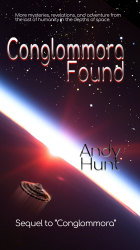

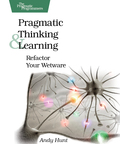
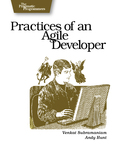
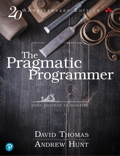
Latest News
-
New article: The Limits of Process
January 25, 2022 -
New article: Habits vs. Practices
January 5, 2022 -
New novel: Weatherly Hall
August 10, 2021 - List All News...
